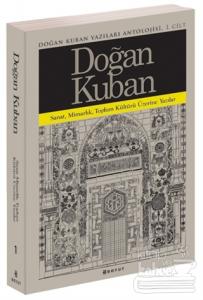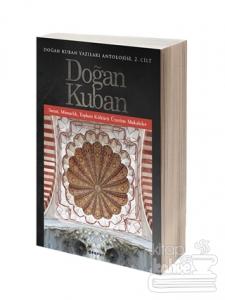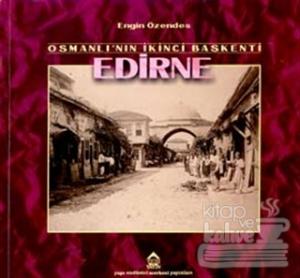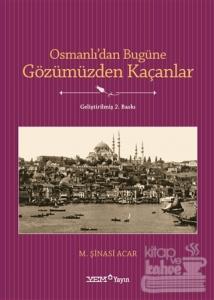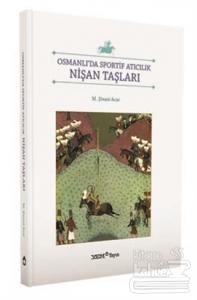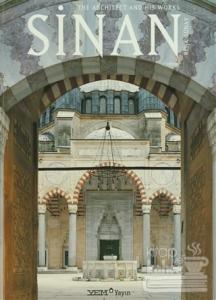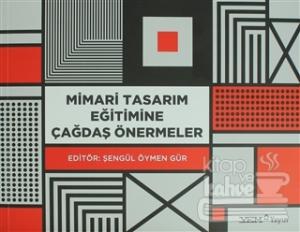
Anadolu'da Selçuklu döneminden kalan en görkemli yapı kabul edilen ve UNESCO Dünya Mirası Listesi'nde yer alan Divriği Külliyesi, mimari konsepti, anıtsal heykel nitelikli bezemesi ve benzeri olmayan yontularıyla, dünya sanat tarihinde Türkiye Ortaçağ sanatının en önemli yapıtı olarak kabul edilir.
Prof. Doğan Kuban'ın kaleme aldığı Cennetin Kapıları / Gates of Paradise, her gün biraz daha yok olmaya yüz tutan Divriği Külliyesi'nin korunması için kamuoyu oluşturmanın ve özel fotoğraflarla görsel olarak belgelenmesinin yanı sıra mimarı ve heykeltıraşı Hürremşah'ın dünyaya tanıtılması amacını da taşıyor. Doğan Kuban, özellikle Cami Kıble Taçkapısı ve Şifahane Taçkapısı'ndaki yontu sanatının eşsizliğini vurguladığı bu kitapta, Hürremşah'ı ve yapıyı şu ifadelerle anlatıyor:
“İran kökenli Hürremşah, 11-12. yüzyıl Selçuklu döneminin yeni oluşumlar ortamında yetişmiş, deneyimli, dâhi bir sanatçıdır. İslam tarihinde başka eşi olmayan bu taç kapıların mimarı ve heykeltıraşı, eski motif sözlüğüne getirdiği yenilikler, mimari tasarım dehası ve özellikle caminin kıble kapısındaki cennet kapısı tasavvuruyla 12-13. yüzyıl İslam Sufizmi'nin sanat alanındaki bir temsilcisi olarak da kabul edilebilir. Anadolu-Türk İslam Ortaçağı'nın Yunus Emre, Hacı Bektaş, Mevlânâ gibi büyük adlarıyla birlikte anılması gereken en büyük Müslüman sanatçılardan biridir Hürremşah (…)
Divriği Ulucamisi ve Şifahanesi'nin taşoyma bezemesi, dönemin ölçütleri dışına çıkan ve bezeme niteliğinden çok bağımsız yontu karakterine yaklaşan özellikleri, zengin sözlüğü, cennet kapısı tasviri üzerine kurgulanmış programı ve tasarımıyla şaşırtıcı bir yenilik ve yaratıcılık sergilemektedir. Mimari ve bezeme arasındaki hiyerarşik ilişkileri ortadan kaldıran eşsiz bir deneme olarak, İslam mimarlık tarihi bağlamında olduğu kadar dünya sanat tarihinde de karşılaştırılabileceği başka bir örnek olmadığı için, mucizevi bir yapıt olarak ortaya çıkar.”
Kitabın İngilizce tanıtım yazısı;
One of the most magnificent buildings surviving from the Anatolian Seljuk era, the Divriği Complex (Külliye) has been included in the UNESCO World Heritage List. With its architectural concept, its monumental statuesque ornamentation and unique sculptures it is considered as the most important medieval Turkish work in world history of art.
In his book Cennetin Kapıları / Gates of Paradise, Prof. Doğan Kuban aims both at documenting the Divriği Complex with photographs and other visual material with a view to gather public opinion support for the protection of the complex, which is deteriorating day by day, and at making its architect and sculptor Hürremşah known to the world. In this book, in which he stresses the uniqueness of the sculptural work achieved especially at the Mosque's southern (kıble) and hospice portals, Doğan Kuban describes Hürremşah and his work as follows:
“Hürremşah was an experienced artist of Iranian origin who was a genius formed in the midst of the new developments brought about by the Seljuk era in the 11-12th century. Unequaled in the Islamic world, the architect and sculptor of these portals can be considered as an artistic representative of 12-13th century Islamic Sufism, be it in his genial architectural design, the innovations he has brought to the old motif repertoire, and especially in his conception of the gate of heaven in the mosque's southern portal. Hürremşah is one of the greatest Muslim artists and he should be remembered together with the great personalities of medieval Turkish-Islamic Anatolia, such as Yunus Emre, Haci Bektaş and Mevlana (...)
With characteristics relating it more to independent sculpture than to ornamentation, with its rich vocabulary and its program and design based on the depiction of the gate of heaven, the Divriği Ulucami and Şifahane stone carving ornamentation digresses from the criteria of its time, exhibiting striking aspects of innovation and creativity. As an incomparable experiment which abolishes the hierarchal relation between architecture and ornamentation, and because there are no other equivalent examples of its kind, this building stands as a miraculous work, both in the context of Islamic architecture and world history of art.”
Anadolu'da Selçuklu döneminden kalan en görkemli yapı kabul edilen ve UNESCO Dünya Mirası Listesi'nde yer alan Divriği Külliyesi, mimari konsepti, anıtsal heykel nitelikli bezemesi ve benzeri olmayan yontularıyla, dünya sanat tarihinde Türkiye Ortaçağ sanatının en önemli yapıtı olarak kabul edilir.
Prof. Doğan Kuban'ın kaleme aldığı Cennetin Kapıları / Gates of Paradise, her gün biraz daha yok olmaya yüz tutan Divriği Külliyesi'nin korunması için kamuoyu oluşturmanın ve özel fotoğraflarla görsel olarak belgelenmesinin yanı sıra mimarı ve heykeltıraşı Hürremşah'ın dünyaya tanıtılması amacını da taşıyor. Doğan Kuban, özellikle Cami Kıble Taçkapısı ve Şifahane Taçkapısı'ndaki yontu sanatının eşsizliğini vurguladığı bu kitapta, Hürremşah'ı ve yapıyı şu ifadelerle anlatıyor:
“İran kökenli Hürremşah, 11-12. yüzyıl Selçuklu döneminin yeni oluşumlar ortamında yetişmiş, deneyimli, dâhi bir sanatçıdır. İslam tarihinde başka eşi olmayan bu taç kapıların mimarı ve heykeltıraşı, eski motif sözlüğüne getirdiği yenilikler, mimari tasarım dehası ve özellikle caminin kıble kapısındaki cennet kapısı tasavvuruyla 12-13. yüzyıl İslam Sufizmi'nin sanat alanındaki bir temsilcisi olarak da kabul edilebilir. Anadolu-Türk İslam Ortaçağı'nın Yunus Emre, Hacı Bektaş, Mevlânâ gibi büyük adlarıyla birlikte anılması gereken en büyük Müslüman sanatçılardan biridir Hürremşah (…)
Divriği Ulucamisi ve Şifahanesi'nin taşoyma bezemesi, dönemin ölçütleri dışına çıkan ve bezeme niteliğinden çok bağımsız yontu karakterine yaklaşan özellikleri, zengin sözlüğü, cennet kapısı tasviri üzerine kurgulanmış programı ve tasarımıyla şaşırtıcı bir yenilik ve yaratıcılık sergilemektedir. Mimari ve bezeme arasındaki hiyerarşik ilişkileri ortadan kaldıran eşsiz bir deneme olarak, İslam mimarlık tarihi bağlamında olduğu kadar dünya sanat tarihinde de karşılaştırılabileceği başka bir örnek olmadığı için, mucizevi bir yapıt olarak ortaya çıkar.”
Kitabın İngilizce tanıtım yazısı;
One of the most magnificent buildings surviving from the Anatolian Seljuk era, the Divriği Complex (Külliye) has been included in the UNESCO World Heritage List. With its architectural concept, its monumental statuesque ornamentation and unique sculptures it is considered as the most important medieval Turkish work in world history of art.
In his book Cennetin Kapıları / Gates of Paradise, Prof. Doğan Kuban aims both at documenting the Divriği Complex with photographs and other visual material with a view to gather public opinion support for the protection of the complex, which is deteriorating day by day, and at making its architect and sculptor Hürremşah known to the world. In this book, in which he stresses the uniqueness of the sculptural work achieved especially at the Mosque's southern (kıble) and hospice portals, Doğan Kuban describes Hürremşah and his work as follows:
“Hürremşah was an experienced artist of Iranian origin who was a genius formed in the midst of the new developments brought about by the Seljuk era in the 11-12th century. Unequaled in the Islamic world, the architect and sculptor of these portals can be considered as an artistic representative of 12-13th century Islamic Sufism, be it in his genial architectural design, the innovations he has brought to the old motif repertoire, and especially in his conception of the gate of heaven in the mosque's southern portal. Hürremşah is one of the greatest Muslim artists and he should be remembered together with the great personalities of medieval Turkish-Islamic Anatolia, such as Yunus Emre, Haci Bektaş and Mevlana (...)
With characteristics relating it more to independent sculpture than to ornamentation, with its rich vocabulary and its program and design based on the depiction of the gate of heaven, the Divriği Ulucami and Şifahane stone carving ornamentation digresses from the criteria of its time, exhibiting striking aspects of innovation and creativity. As an incomparable experiment which abolishes the hierarchal relation between architecture and ornamentation, and because there are no other equivalent examples of its kind, this building stands as a miraculous work, both in the context of Islamic architecture and world history of art.”


